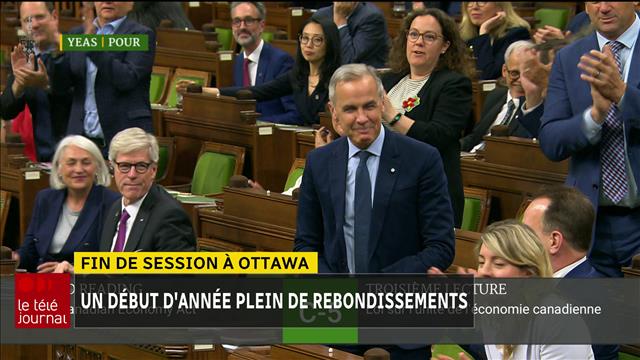Conservative deputies voted with the minority liberal government in favor of the adoption of their flagship bill on major projects on Friday evening, thus providing for its adoption before Canada Festival.
This bill, also known as the Canadian Economy Unit law, would allow the government to approve a list of projects deemed of national interest, thus accelerating their approval.
The Liberals presented it as the heart of the government’s national economic response to American customs duties.
This is what differentiates us from the United States, this is what makes us more independent of the United States, this is what will make us progress
said Prime Minister Mark Carney said at a press conference on Friday evening.
He defended the speed with which his government had this bill adopted in the House, saying that it should be adopted quickly Because we are in crisis
.
And if you think we are not in crisis, go to Sault-Sainte-Marie, go to Hamilton, go to Windsor.
This bill was presented on June 6 and was adopted in the House after about eight hours of study on Tuesday and Wednesday.
After the second of the two votes in the House of Commons on Friday, Mark Carney crossed the prosecution to shake hands with the leader of the opposition to the Chamber, Andrew Scheer, and the assistant head of the Conservative Party, Melissa Lantsman.
Two votes took place instead of one, the president of the chamber having ruled that the bill included two distinct parts without a clear common element.
This allowed the deputies of the Bloc Québécois and the new Democratic Party (NPD) to vote in favor of the first part of the bill, which aims to eliminate obstacles to domestic trade, and against the second, more controversial, which relates to major projects.
Project lists
The Prime Ministers of the Provinces and Territories provided the government with lists of projects of which they wish to accelerate the approval under the law, but no national list of projects has been established, said Carney.
We all agree that more in -depth discussions are necessary to select the national building projects and to determine the conditions they must fulfill. In other words, the real work begins now
explained Mr. Carney.
At least two prime ministers do not agree with the projects to be accelerated.
The Prime Minister of Alberta, Danielle Smith, is optimistic about the construction of a pipeline that would cross British Columbia, while the Prime Minister of British Columbia, David Eby, underlined the absence of a project and financing promoter for a pipeline.
After a meeting of the Prime Ministers on Friday, Eby explained in a press release that he had made his colleagues understand the crucial role of his province in the realization of the priorities of the Prime Ministers.
As a gateway to the growing markets of Asia-Pacific, the success of any commercial diversification strategy for Canada is based on our success as a province. British Columbia is the economic engine of new Canada and must be treated fairly by Ottawa in terms of investment in infrastructure
said Eby.
Carney assured that his government will not impose projects on the provinces or the territories between it.

The report by Julie-Anne Lapointe.
Criticisms
This bill has aroused criticism from indigenous leaders and environmental groups, who believe that it will give the federal office an excessive power which will allow it to bypass existing laws.
The Chamber’s Committee has awarded the bill, in particular to withdraw the Indian Act from the list of laws that the government will be able to circumvent when it will determine if a project must move forward.
First Nations leaders have warned that this bill could violate their constitutional rights and give rise to legal challenges.
Mark Carney tried to appease some of these concerns during his Friday press conference.
The office of major projects will have an indigenous advisory council, the main function of which will consist in respecting the rights guaranteed by article 35 in the implementation of this bill.
He promised to organize a day’s summits with rights holders and First Nations, Inuit and Métis leaders in the coming weeks, in the presence of the Minister of Couronne-Autochtones, Rebecca Alty, and the Minister of Aboriginal Services, Mandy Gull-Masty.
Consultation, cooperation, commitment and participation are at the heart of this bill
he explained.
Ms. Alty explained that the Prime Minister’s decision to organize these summits is a serious signal
according to which the rights of the natives will be respected.
Supports
The Canada Chamber of Commerce praised the adoption of the bill, affirming in a press release that he responds to difficulties
of the economic crisis caused by the trade war of US President Donald Trump.
The president and chief executive officer of TC Energy, François Poirier, described him as Not forward Biparisan to allow Canada to relaunch themselves in major national construction projects
but he added that the country’s regulatory framework needs to be reformed.
Andrew Scheer, who spoke with journalists after the votes, said that his colleagues and himself supported this bill, because If there is the slightest gleam of hope that it can succeed, the conservatives will not oppose it
.
We’ll see what’s going on now
he added.
The House of Commons postponed its work until September. The bill is now sent to the Senate, which should sit until June 27.

